Nursing Care Essay: Patient-Centered Assessment, Older People
VerifiedAdded on 2022/09/29
|12
|2687
|23
Essay
AI Summary
This essay focuses on patient-centered assessment for older adults experiencing loneliness, anxiety, and depression. It begins with an introduction to the topic, emphasizing the importance of a patient-centered approach in geriatric care, which prioritizes the individual's needs and perspectives. The essay includes a critical reflection based on an interview with an older person, highlighting issues such as social isolation, financial constraints, and declining health, which underscores the challenges faced by this population. A literature review synthesizes research on psychological factors related to aging, including socioeconomic status, health perceptions, and workforce issues, supporting the essay's core arguments. The discussion section proposes interventions such as community involvement and health check-ups to address the identified needs. The conclusion reiterates the significance of a holistic approach to care that considers the individual's overall well-being and emphasizes the importance of social support and equal treatment. The essay references various articles to support its arguments and includes appendices with interview questions and a literature review summary.
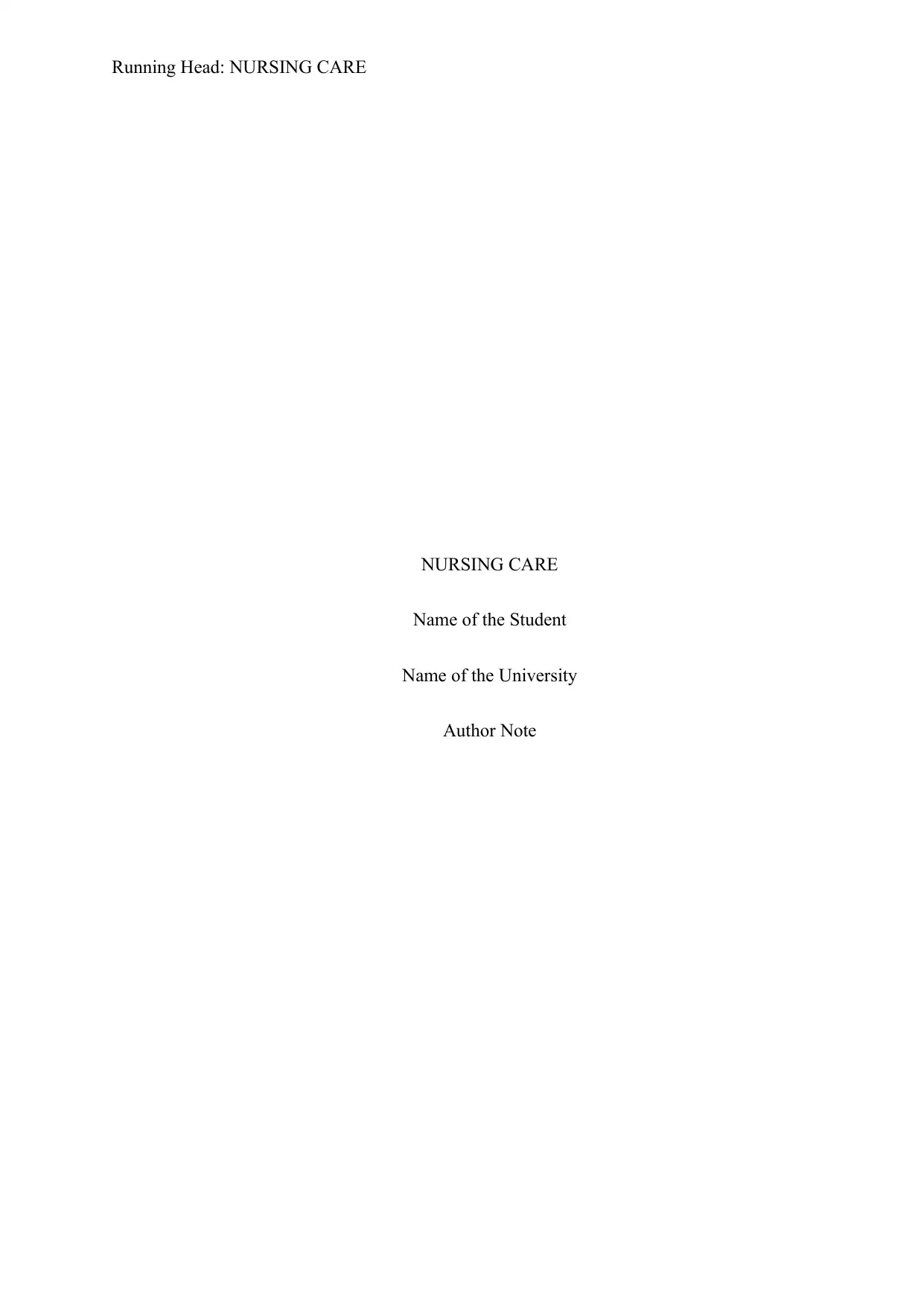
Running Head: NURSING CARE
NURSING CARE
Name of the Student
Name of the University
Author Note
NURSING CARE
Name of the Student
Name of the University
Author Note
Paraphrase This Document
Need a fresh take? Get an instant paraphrase of this document with our AI Paraphraser
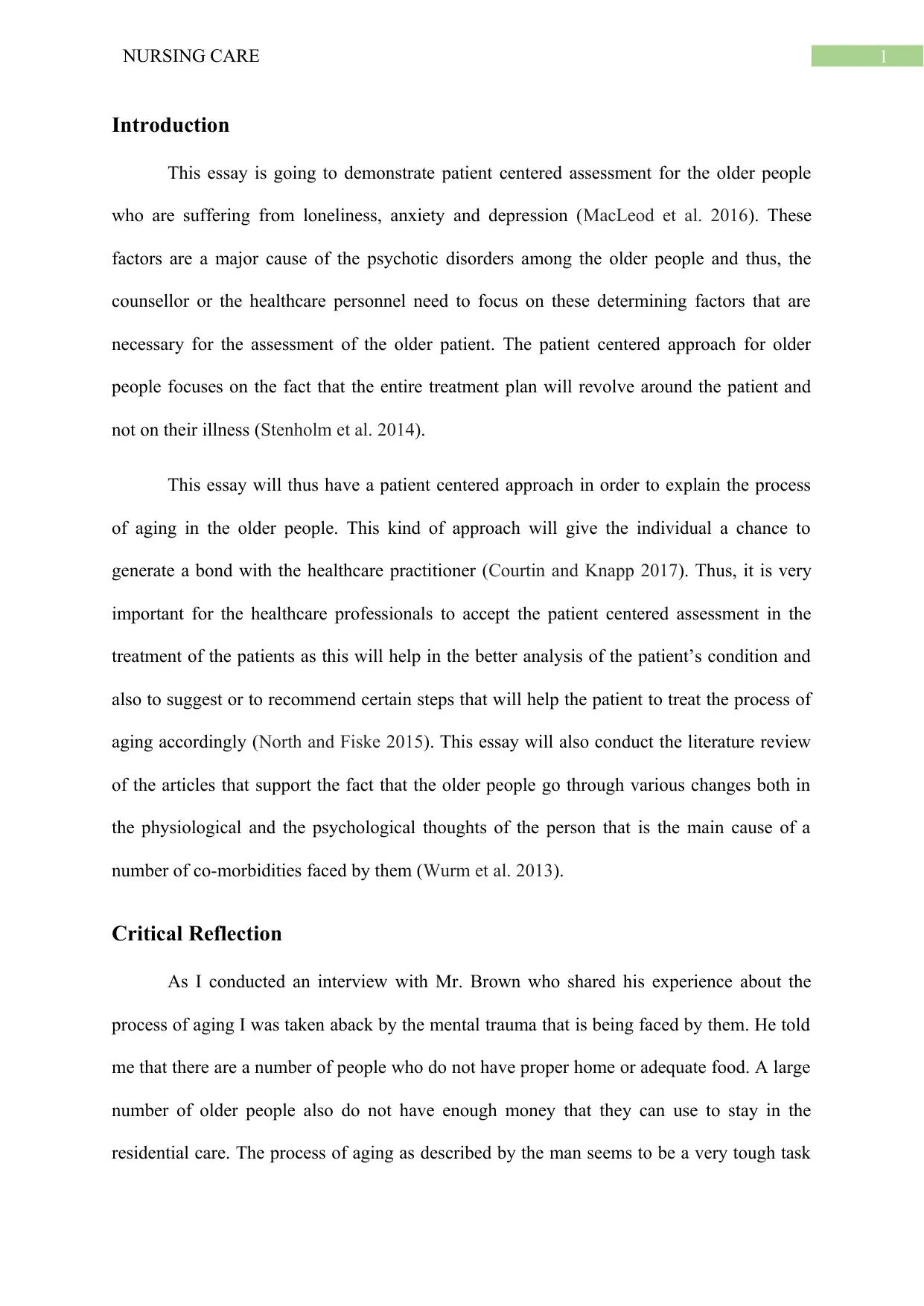
1NURSING CARE
Introduction
This essay is going to demonstrate patient centered assessment for the older people
who are suffering from loneliness, anxiety and depression (MacLeod et al. 2016). These
factors are a major cause of the psychotic disorders among the older people and thus, the
counsellor or the healthcare personnel need to focus on these determining factors that are
necessary for the assessment of the older patient. The patient centered approach for older
people focuses on the fact that the entire treatment plan will revolve around the patient and
not on their illness (Stenholm et al. 2014).
This essay will thus have a patient centered approach in order to explain the process
of aging in the older people. This kind of approach will give the individual a chance to
generate a bond with the healthcare practitioner (Courtin and Knapp 2017). Thus, it is very
important for the healthcare professionals to accept the patient centered assessment in the
treatment of the patients as this will help in the better analysis of the patient’s condition and
also to suggest or to recommend certain steps that will help the patient to treat the process of
aging accordingly (North and Fiske 2015). This essay will also conduct the literature review
of the articles that support the fact that the older people go through various changes both in
the physiological and the psychological thoughts of the person that is the main cause of a
number of co-morbidities faced by them (Wurm et al. 2013).
Critical Reflection
As I conducted an interview with Mr. Brown who shared his experience about the
process of aging I was taken aback by the mental trauma that is being faced by them. He told
me that there are a number of people who do not have proper home or adequate food. A large
number of older people also do not have enough money that they can use to stay in the
residential care. The process of aging as described by the man seems to be a very tough task
Introduction
This essay is going to demonstrate patient centered assessment for the older people
who are suffering from loneliness, anxiety and depression (MacLeod et al. 2016). These
factors are a major cause of the psychotic disorders among the older people and thus, the
counsellor or the healthcare personnel need to focus on these determining factors that are
necessary for the assessment of the older patient. The patient centered approach for older
people focuses on the fact that the entire treatment plan will revolve around the patient and
not on their illness (Stenholm et al. 2014).
This essay will thus have a patient centered approach in order to explain the process
of aging in the older people. This kind of approach will give the individual a chance to
generate a bond with the healthcare practitioner (Courtin and Knapp 2017). Thus, it is very
important for the healthcare professionals to accept the patient centered assessment in the
treatment of the patients as this will help in the better analysis of the patient’s condition and
also to suggest or to recommend certain steps that will help the patient to treat the process of
aging accordingly (North and Fiske 2015). This essay will also conduct the literature review
of the articles that support the fact that the older people go through various changes both in
the physiological and the psychological thoughts of the person that is the main cause of a
number of co-morbidities faced by them (Wurm et al. 2013).
Critical Reflection
As I conducted an interview with Mr. Brown who shared his experience about the
process of aging I was taken aback by the mental trauma that is being faced by them. He told
me that there are a number of people who do not have proper home or adequate food. A large
number of older people also do not have enough money that they can use to stay in the
residential care. The process of aging as described by the man seems to be a very tough task
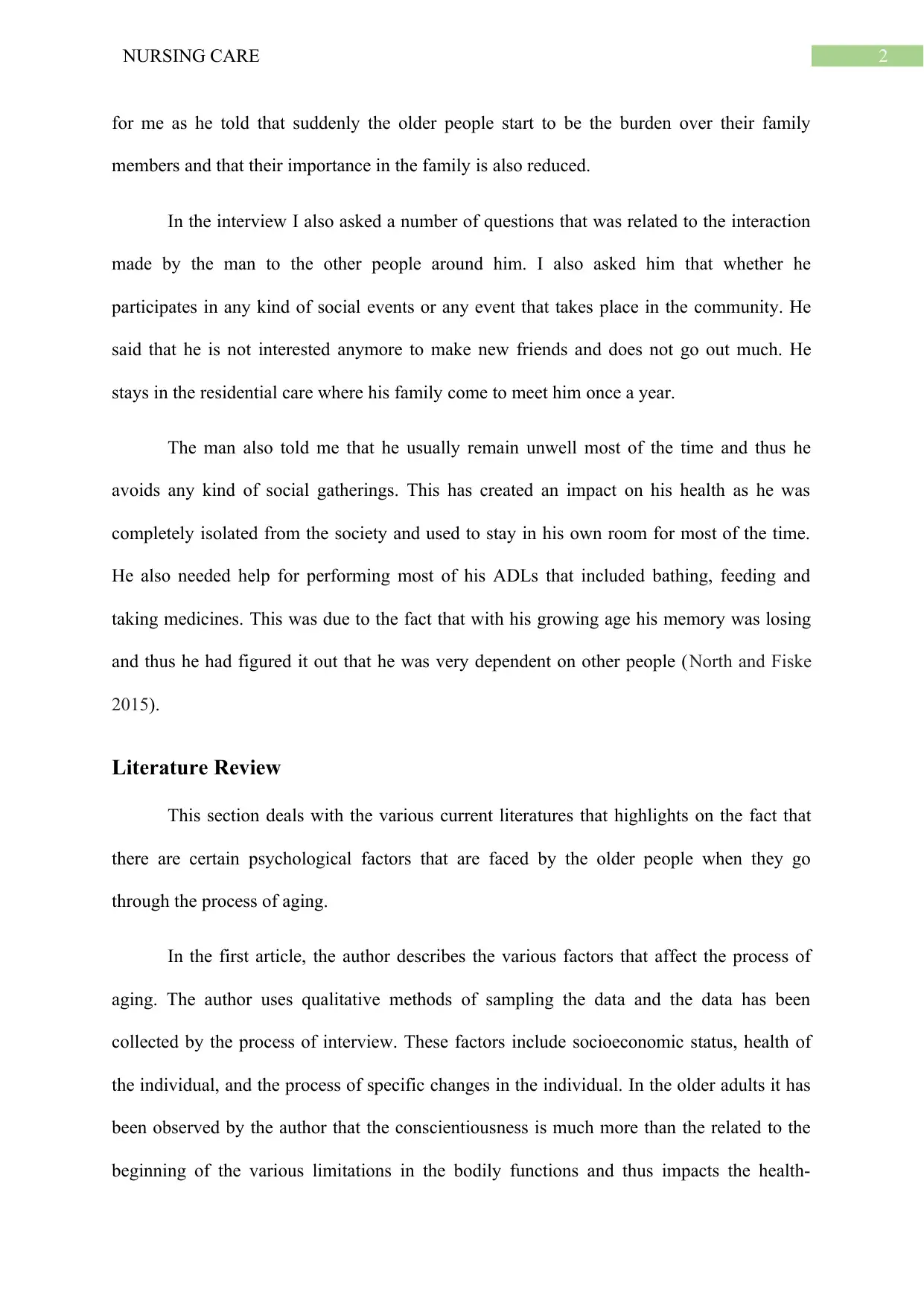
2NURSING CARE
for me as he told that suddenly the older people start to be the burden over their family
members and that their importance in the family is also reduced.
In the interview I also asked a number of questions that was related to the interaction
made by the man to the other people around him. I also asked him that whether he
participates in any kind of social events or any event that takes place in the community. He
said that he is not interested anymore to make new friends and does not go out much. He
stays in the residential care where his family come to meet him once a year.
The man also told me that he usually remain unwell most of the time and thus he
avoids any kind of social gatherings. This has created an impact on his health as he was
completely isolated from the society and used to stay in his own room for most of the time.
He also needed help for performing most of his ADLs that included bathing, feeding and
taking medicines. This was due to the fact that with his growing age his memory was losing
and thus he had figured it out that he was very dependent on other people (North and Fiske
2015).
Literature Review
This section deals with the various current literatures that highlights on the fact that
there are certain psychological factors that are faced by the older people when they go
through the process of aging.
In the first article, the author describes the various factors that affect the process of
aging. The author uses qualitative methods of sampling the data and the data has been
collected by the process of interview. These factors include socioeconomic status, health of
the individual, and the process of specific changes in the individual. In the older adults it has
been observed by the author that the conscientiousness is much more than the related to the
beginning of the various limitations in the bodily functions and thus impacts the health-
for me as he told that suddenly the older people start to be the burden over their family
members and that their importance in the family is also reduced.
In the interview I also asked a number of questions that was related to the interaction
made by the man to the other people around him. I also asked him that whether he
participates in any kind of social events or any event that takes place in the community. He
said that he is not interested anymore to make new friends and does not go out much. He
stays in the residential care where his family come to meet him once a year.
The man also told me that he usually remain unwell most of the time and thus he
avoids any kind of social gatherings. This has created an impact on his health as he was
completely isolated from the society and used to stay in his own room for most of the time.
He also needed help for performing most of his ADLs that included bathing, feeding and
taking medicines. This was due to the fact that with his growing age his memory was losing
and thus he had figured it out that he was very dependent on other people (North and Fiske
2015).
Literature Review
This section deals with the various current literatures that highlights on the fact that
there are certain psychological factors that are faced by the older people when they go
through the process of aging.
In the first article, the author describes the various factors that affect the process of
aging. The author uses qualitative methods of sampling the data and the data has been
collected by the process of interview. These factors include socioeconomic status, health of
the individual, and the process of specific changes in the individual. In the older adults it has
been observed by the author that the conscientiousness is much more than the related to the
beginning of the various limitations in the bodily functions and thus impacts the health-
⊘ This is a preview!⊘
Do you want full access?
Subscribe today to unlock all pages.

Trusted by 1+ million students worldwide
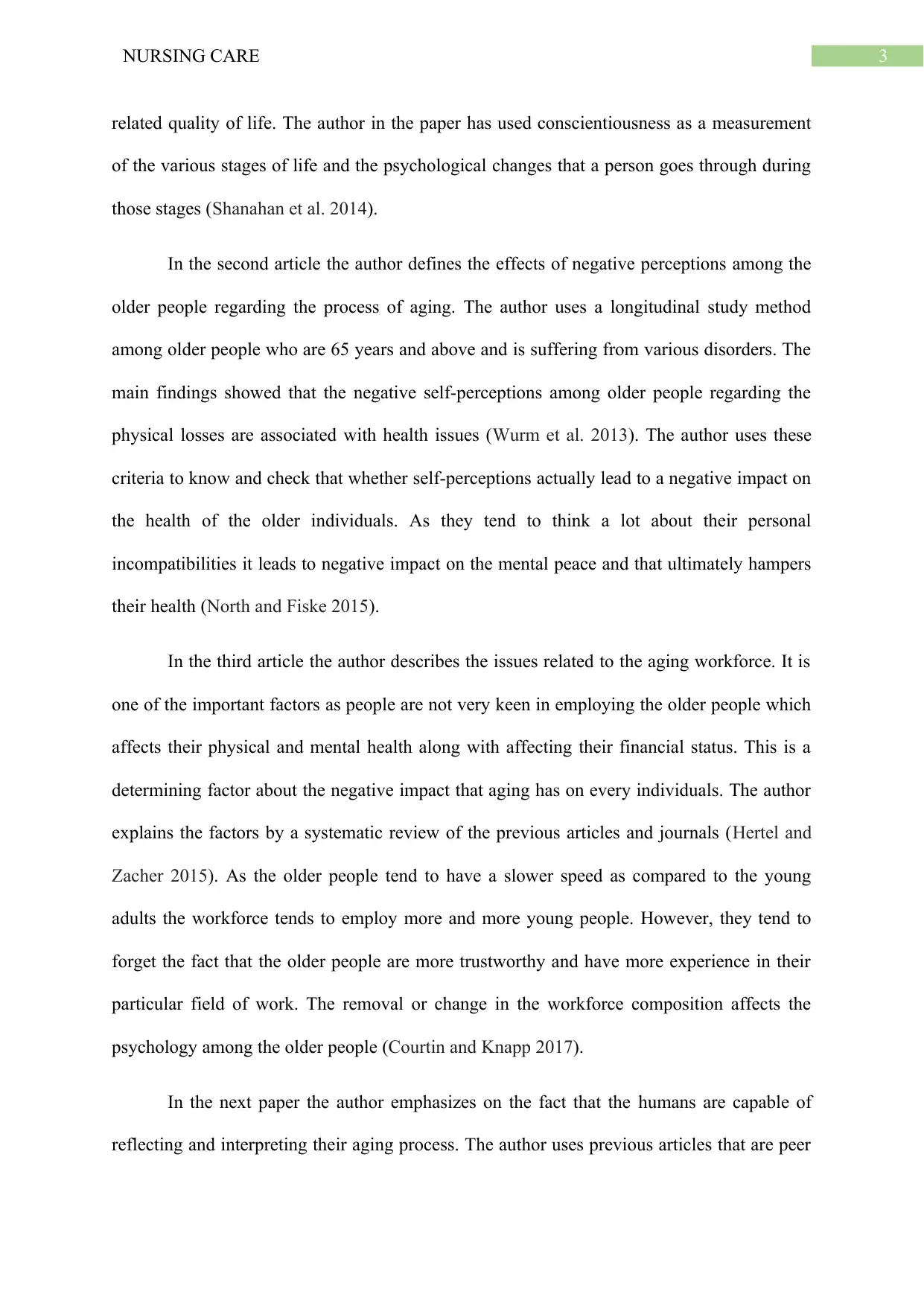
3NURSING CARE
related quality of life. The author in the paper has used conscientiousness as a measurement
of the various stages of life and the psychological changes that a person goes through during
those stages (Shanahan et al. 2014).
In the second article the author defines the effects of negative perceptions among the
older people regarding the process of aging. The author uses a longitudinal study method
among older people who are 65 years and above and is suffering from various disorders. The
main findings showed that the negative self-perceptions among older people regarding the
physical losses are associated with health issues (Wurm et al. 2013). The author uses these
criteria to know and check that whether self-perceptions actually lead to a negative impact on
the health of the older individuals. As they tend to think a lot about their personal
incompatibilities it leads to negative impact on the mental peace and that ultimately hampers
their health (North and Fiske 2015).
In the third article the author describes the issues related to the aging workforce. It is
one of the important factors as people are not very keen in employing the older people which
affects their physical and mental health along with affecting their financial status. This is a
determining factor about the negative impact that aging has on every individuals. The author
explains the factors by a systematic review of the previous articles and journals (Hertel and
Zacher 2015). As the older people tend to have a slower speed as compared to the young
adults the workforce tends to employ more and more young people. However, they tend to
forget the fact that the older people are more trustworthy and have more experience in their
particular field of work. The removal or change in the workforce composition affects the
psychology among the older people (Courtin and Knapp 2017).
In the next paper the author emphasizes on the fact that the humans are capable of
reflecting and interpreting their aging process. The author uses previous articles that are peer
related quality of life. The author in the paper has used conscientiousness as a measurement
of the various stages of life and the psychological changes that a person goes through during
those stages (Shanahan et al. 2014).
In the second article the author defines the effects of negative perceptions among the
older people regarding the process of aging. The author uses a longitudinal study method
among older people who are 65 years and above and is suffering from various disorders. The
main findings showed that the negative self-perceptions among older people regarding the
physical losses are associated with health issues (Wurm et al. 2013). The author uses these
criteria to know and check that whether self-perceptions actually lead to a negative impact on
the health of the older individuals. As they tend to think a lot about their personal
incompatibilities it leads to negative impact on the mental peace and that ultimately hampers
their health (North and Fiske 2015).
In the third article the author describes the issues related to the aging workforce. It is
one of the important factors as people are not very keen in employing the older people which
affects their physical and mental health along with affecting their financial status. This is a
determining factor about the negative impact that aging has on every individuals. The author
explains the factors by a systematic review of the previous articles and journals (Hertel and
Zacher 2015). As the older people tend to have a slower speed as compared to the young
adults the workforce tends to employ more and more young people. However, they tend to
forget the fact that the older people are more trustworthy and have more experience in their
particular field of work. The removal or change in the workforce composition affects the
psychology among the older people (Courtin and Knapp 2017).
In the next paper the author emphasizes on the fact that the humans are capable of
reflecting and interpreting their aging process. The author uses previous articles that are peer
Paraphrase This Document
Need a fresh take? Get an instant paraphrase of this document with our AI Paraphraser
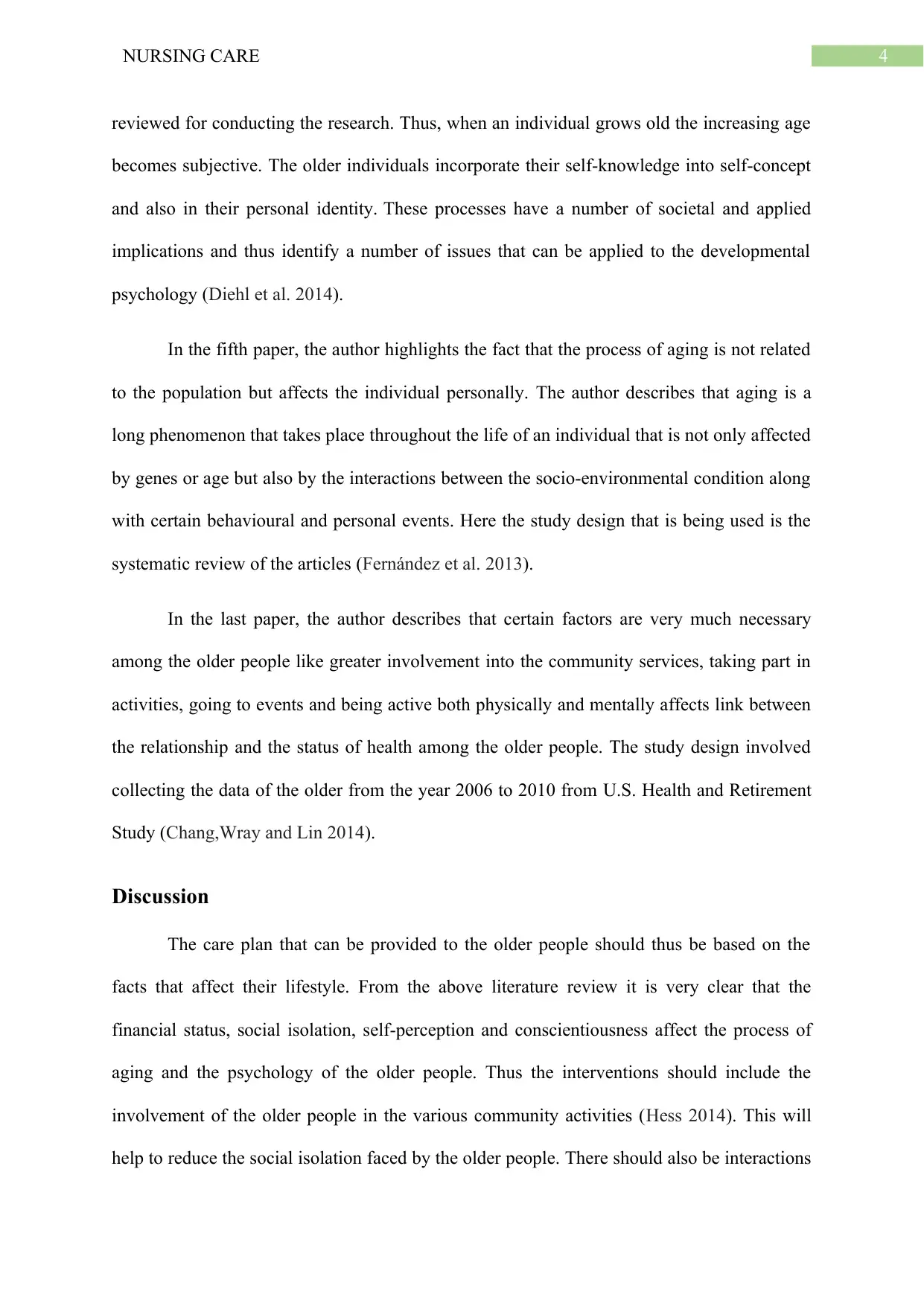
4NURSING CARE
reviewed for conducting the research. Thus, when an individual grows old the increasing age
becomes subjective. The older individuals incorporate their self-knowledge into self-concept
and also in their personal identity. These processes have a number of societal and applied
implications and thus identify a number of issues that can be applied to the developmental
psychology (Diehl et al. 2014).
In the fifth paper, the author highlights the fact that the process of aging is not related
to the population but affects the individual personally. The author describes that aging is a
long phenomenon that takes place throughout the life of an individual that is not only affected
by genes or age but also by the interactions between the socio-environmental condition along
with certain behavioural and personal events. Here the study design that is being used is the
systematic review of the articles (Fernández et al. 2013).
In the last paper, the author describes that certain factors are very much necessary
among the older people like greater involvement into the community services, taking part in
activities, going to events and being active both physically and mentally affects link between
the relationship and the status of health among the older people. The study design involved
collecting the data of the older from the year 2006 to 2010 from U.S. Health and Retirement
Study (Chang,Wray and Lin 2014).
Discussion
The care plan that can be provided to the older people should thus be based on the
facts that affect their lifestyle. From the above literature review it is very clear that the
financial status, social isolation, self-perception and conscientiousness affect the process of
aging and the psychology of the older people. Thus the interventions should include the
involvement of the older people in the various community activities (Hess 2014). This will
help to reduce the social isolation faced by the older people. There should also be interactions
reviewed for conducting the research. Thus, when an individual grows old the increasing age
becomes subjective. The older individuals incorporate their self-knowledge into self-concept
and also in their personal identity. These processes have a number of societal and applied
implications and thus identify a number of issues that can be applied to the developmental
psychology (Diehl et al. 2014).
In the fifth paper, the author highlights the fact that the process of aging is not related
to the population but affects the individual personally. The author describes that aging is a
long phenomenon that takes place throughout the life of an individual that is not only affected
by genes or age but also by the interactions between the socio-environmental condition along
with certain behavioural and personal events. Here the study design that is being used is the
systematic review of the articles (Fernández et al. 2013).
In the last paper, the author describes that certain factors are very much necessary
among the older people like greater involvement into the community services, taking part in
activities, going to events and being active both physically and mentally affects link between
the relationship and the status of health among the older people. The study design involved
collecting the data of the older from the year 2006 to 2010 from U.S. Health and Retirement
Study (Chang,Wray and Lin 2014).
Discussion
The care plan that can be provided to the older people should thus be based on the
facts that affect their lifestyle. From the above literature review it is very clear that the
financial status, social isolation, self-perception and conscientiousness affect the process of
aging and the psychology of the older people. Thus the interventions should include the
involvement of the older people in the various community activities (Hess 2014). This will
help to reduce the social isolation faced by the older people. There should also be interactions
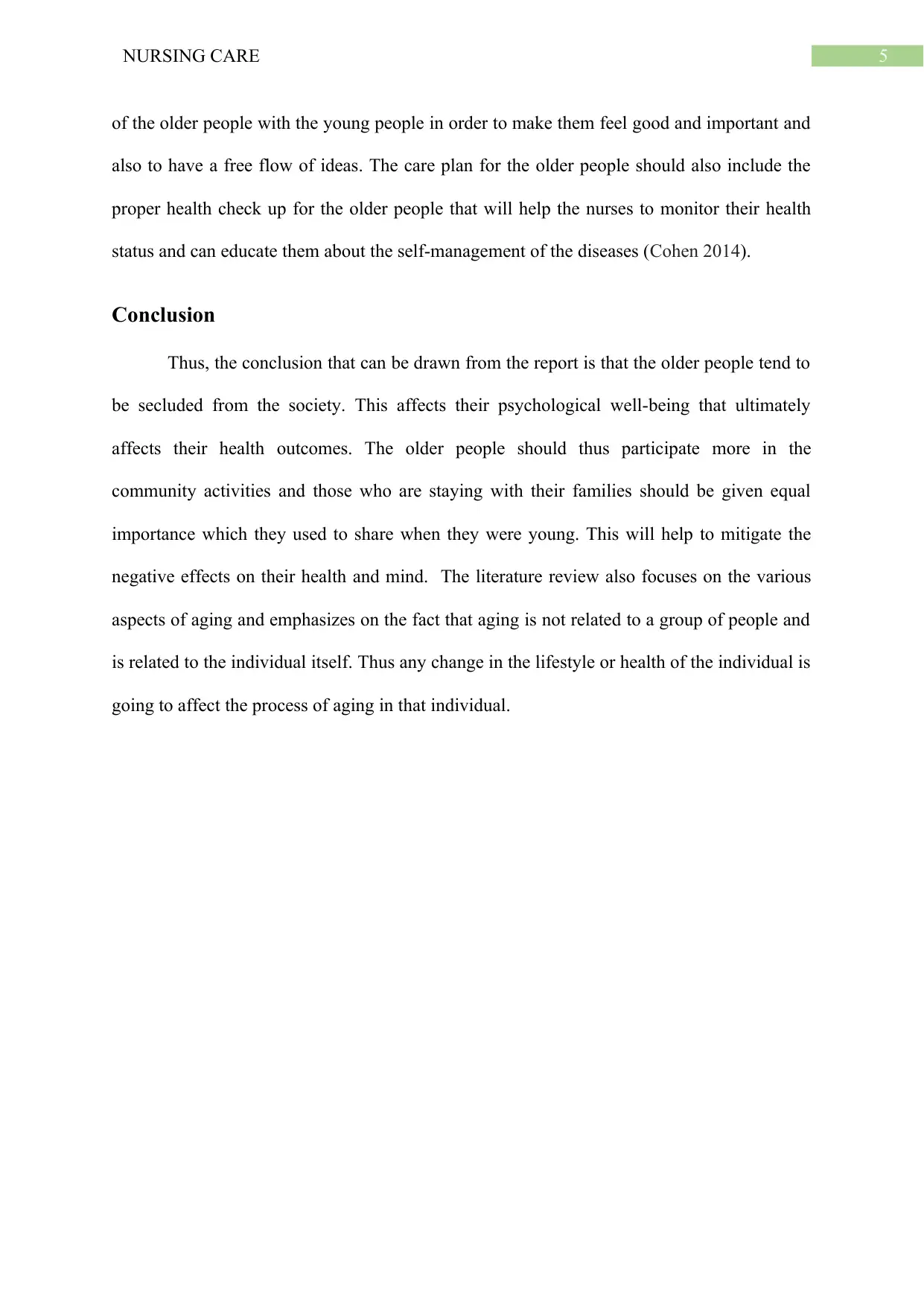
5NURSING CARE
of the older people with the young people in order to make them feel good and important and
also to have a free flow of ideas. The care plan for the older people should also include the
proper health check up for the older people that will help the nurses to monitor their health
status and can educate them about the self-management of the diseases (Cohen 2014).
Conclusion
Thus, the conclusion that can be drawn from the report is that the older people tend to
be secluded from the society. This affects their psychological well-being that ultimately
affects their health outcomes. The older people should thus participate more in the
community activities and those who are staying with their families should be given equal
importance which they used to share when they were young. This will help to mitigate the
negative effects on their health and mind. The literature review also focuses on the various
aspects of aging and emphasizes on the fact that aging is not related to a group of people and
is related to the individual itself. Thus any change in the lifestyle or health of the individual is
going to affect the process of aging in that individual.
of the older people with the young people in order to make them feel good and important and
also to have a free flow of ideas. The care plan for the older people should also include the
proper health check up for the older people that will help the nurses to monitor their health
status and can educate them about the self-management of the diseases (Cohen 2014).
Conclusion
Thus, the conclusion that can be drawn from the report is that the older people tend to
be secluded from the society. This affects their psychological well-being that ultimately
affects their health outcomes. The older people should thus participate more in the
community activities and those who are staying with their families should be given equal
importance which they used to share when they were young. This will help to mitigate the
negative effects on their health and mind. The literature review also focuses on the various
aspects of aging and emphasizes on the fact that aging is not related to a group of people and
is related to the individual itself. Thus any change in the lifestyle or health of the individual is
going to affect the process of aging in that individual.
⊘ This is a preview!⊘
Do you want full access?
Subscribe today to unlock all pages.

Trusted by 1+ million students worldwide
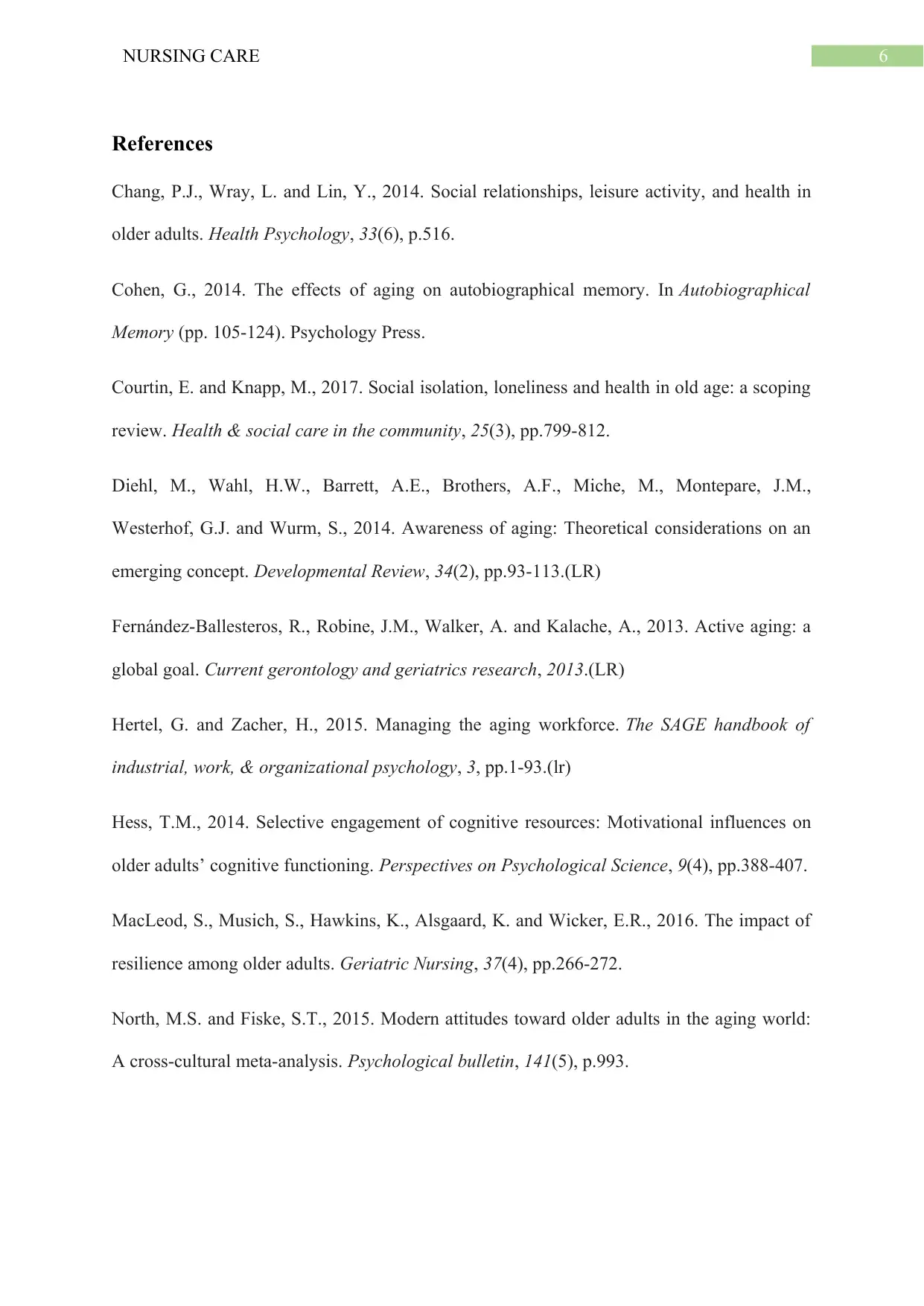
6NURSING CARE
References
Chang, P.J., Wray, L. and Lin, Y., 2014. Social relationships, leisure activity, and health in
older adults. Health Psychology, 33(6), p.516.
Cohen, G., 2014. The effects of aging on autobiographical memory. In Autobiographical
Memory (pp. 105-124). Psychology Press.
Courtin, E. and Knapp, M., 2017. Social isolation, loneliness and health in old age: a scoping
review. Health & social care in the community, 25(3), pp.799-812.
Diehl, M., Wahl, H.W., Barrett, A.E., Brothers, A.F., Miche, M., Montepare, J.M.,
Westerhof, G.J. and Wurm, S., 2014. Awareness of aging: Theoretical considerations on an
emerging concept. Developmental Review, 34(2), pp.93-113.(LR)
Fernández-Ballesteros, R., Robine, J.M., Walker, A. and Kalache, A., 2013. Active aging: a
global goal. Current gerontology and geriatrics research, 2013.(LR)
Hertel, G. and Zacher, H., 2015. Managing the aging workforce. The SAGE handbook of
industrial, work, & organizational psychology, 3, pp.1-93.(lr)
Hess, T.M., 2014. Selective engagement of cognitive resources: Motivational influences on
older adults’ cognitive functioning. Perspectives on Psychological Science, 9(4), pp.388-407.
MacLeod, S., Musich, S., Hawkins, K., Alsgaard, K. and Wicker, E.R., 2016. The impact of
resilience among older adults. Geriatric Nursing, 37(4), pp.266-272.
North, M.S. and Fiske, S.T., 2015. Modern attitudes toward older adults in the aging world:
A cross-cultural meta-analysis. Psychological bulletin, 141(5), p.993.
References
Chang, P.J., Wray, L. and Lin, Y., 2014. Social relationships, leisure activity, and health in
older adults. Health Psychology, 33(6), p.516.
Cohen, G., 2014. The effects of aging on autobiographical memory. In Autobiographical
Memory (pp. 105-124). Psychology Press.
Courtin, E. and Knapp, M., 2017. Social isolation, loneliness and health in old age: a scoping
review. Health & social care in the community, 25(3), pp.799-812.
Diehl, M., Wahl, H.W., Barrett, A.E., Brothers, A.F., Miche, M., Montepare, J.M.,
Westerhof, G.J. and Wurm, S., 2014. Awareness of aging: Theoretical considerations on an
emerging concept. Developmental Review, 34(2), pp.93-113.(LR)
Fernández-Ballesteros, R., Robine, J.M., Walker, A. and Kalache, A., 2013. Active aging: a
global goal. Current gerontology and geriatrics research, 2013.(LR)
Hertel, G. and Zacher, H., 2015. Managing the aging workforce. The SAGE handbook of
industrial, work, & organizational psychology, 3, pp.1-93.(lr)
Hess, T.M., 2014. Selective engagement of cognitive resources: Motivational influences on
older adults’ cognitive functioning. Perspectives on Psychological Science, 9(4), pp.388-407.
MacLeod, S., Musich, S., Hawkins, K., Alsgaard, K. and Wicker, E.R., 2016. The impact of
resilience among older adults. Geriatric Nursing, 37(4), pp.266-272.
North, M.S. and Fiske, S.T., 2015. Modern attitudes toward older adults in the aging world:
A cross-cultural meta-analysis. Psychological bulletin, 141(5), p.993.
Paraphrase This Document
Need a fresh take? Get an instant paraphrase of this document with our AI Paraphraser
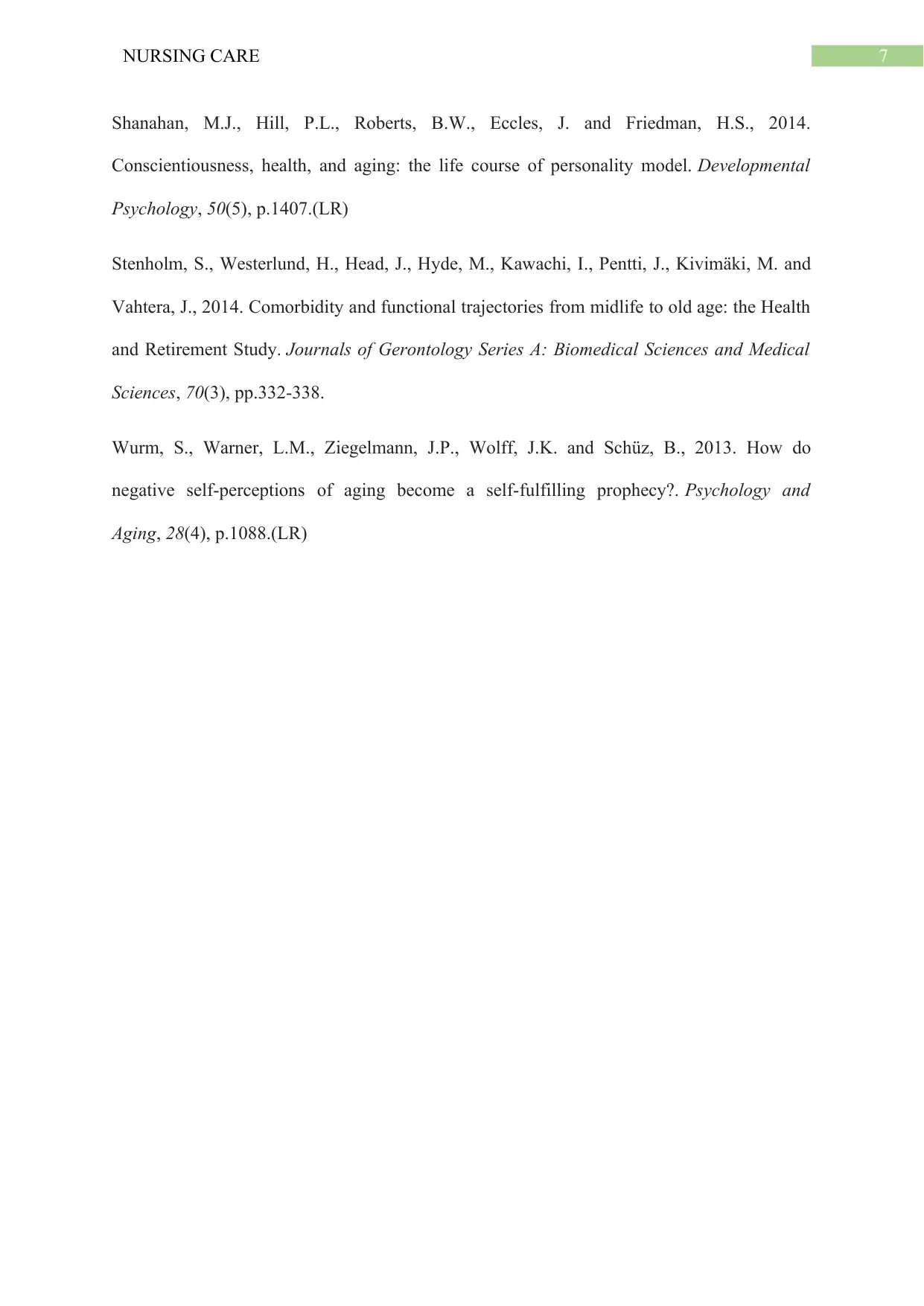
7NURSING CARE
Shanahan, M.J., Hill, P.L., Roberts, B.W., Eccles, J. and Friedman, H.S., 2014.
Conscientiousness, health, and aging: the life course of personality model. Developmental
Psychology, 50(5), p.1407.(LR)
Stenholm, S., Westerlund, H., Head, J., Hyde, M., Kawachi, I., Pentti, J., Kivimäki, M. and
Vahtera, J., 2014. Comorbidity and functional trajectories from midlife to old age: the Health
and Retirement Study. Journals of Gerontology Series A: Biomedical Sciences and Medical
Sciences, 70(3), pp.332-338.
Wurm, S., Warner, L.M., Ziegelmann, J.P., Wolff, J.K. and Schüz, B., 2013. How do
negative self-perceptions of aging become a self-fulfilling prophecy?. Psychology and
Aging, 28(4), p.1088.(LR)
Shanahan, M.J., Hill, P.L., Roberts, B.W., Eccles, J. and Friedman, H.S., 2014.
Conscientiousness, health, and aging: the life course of personality model. Developmental
Psychology, 50(5), p.1407.(LR)
Stenholm, S., Westerlund, H., Head, J., Hyde, M., Kawachi, I., Pentti, J., Kivimäki, M. and
Vahtera, J., 2014. Comorbidity and functional trajectories from midlife to old age: the Health
and Retirement Study. Journals of Gerontology Series A: Biomedical Sciences and Medical
Sciences, 70(3), pp.332-338.
Wurm, S., Warner, L.M., Ziegelmann, J.P., Wolff, J.K. and Schüz, B., 2013. How do
negative self-perceptions of aging become a self-fulfilling prophecy?. Psychology and
Aging, 28(4), p.1088.(LR)
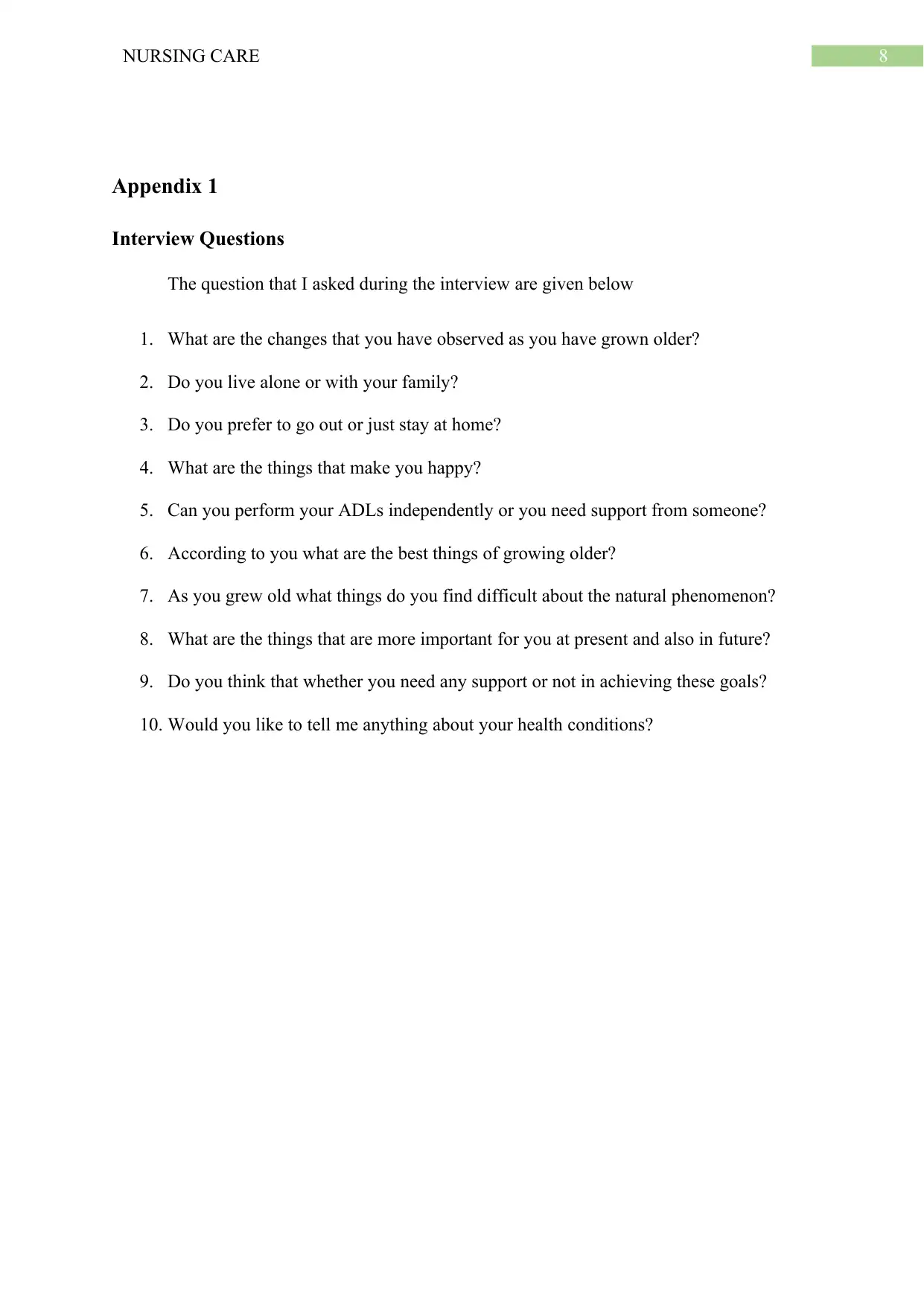
8NURSING CARE
Appendix 1
Interview Questions
The question that I asked during the interview are given below
1. What are the changes that you have observed as you have grown older?
2. Do you live alone or with your family?
3. Do you prefer to go out or just stay at home?
4. What are the things that make you happy?
5. Can you perform your ADLs independently or you need support from someone?
6. According to you what are the best things of growing older?
7. As you grew old what things do you find difficult about the natural phenomenon?
8. What are the things that are more important for you at present and also in future?
9. Do you think that whether you need any support or not in achieving these goals?
10. Would you like to tell me anything about your health conditions?
Appendix 1
Interview Questions
The question that I asked during the interview are given below
1. What are the changes that you have observed as you have grown older?
2. Do you live alone or with your family?
3. Do you prefer to go out or just stay at home?
4. What are the things that make you happy?
5. Can you perform your ADLs independently or you need support from someone?
6. According to you what are the best things of growing older?
7. As you grew old what things do you find difficult about the natural phenomenon?
8. What are the things that are more important for you at present and also in future?
9. Do you think that whether you need any support or not in achieving these goals?
10. Would you like to tell me anything about your health conditions?
⊘ This is a preview!⊘
Do you want full access?
Subscribe today to unlock all pages.

Trusted by 1+ million students worldwide
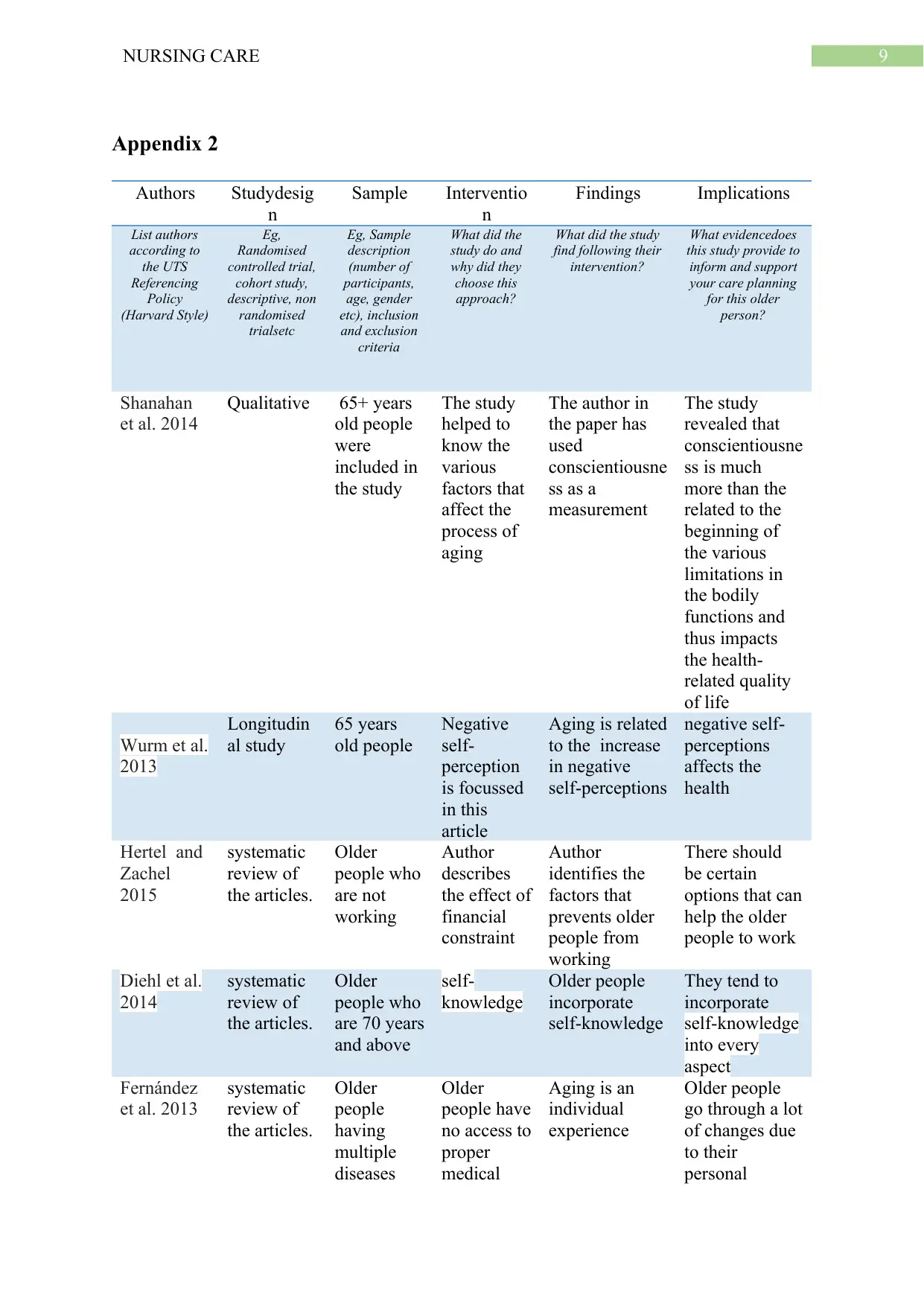
9NURSING CARE
Appendix 2
Authors Studydesig
n
Sample Interventio
n
Findings Implications
List authors
according to
the UTS
Referencing
Policy
(Harvard Style)
Eg,
Randomised
controlled trial,
cohort study,
descriptive, non
randomised
trialsetc
Eg, Sample
description
(number of
participants,
age, gender
etc), inclusion
and exclusion
criteria
What did the
study do and
why did they
choose this
approach?
What did the study
find following their
intervention?
What evidencedoes
this study provide to
inform and support
your care planning
for this older
person?
Shanahan
et al. 2014
Qualitative 65+ years
old people
were
included in
the study
The study
helped to
know the
various
factors that
affect the
process of
aging
The author in
the paper has
used
conscientiousne
ss as a
measurement
The study
revealed that
conscientiousne
ss is much
more than the
related to the
beginning of
the various
limitations in
the bodily
functions and
thus impacts
the health-
related quality
of life
Wurm et al.
2013
Longitudin
al study
65 years
old people
Negative
self-
perception
is focussed
in this
article
Aging is related
to the increase
in negative
self-perceptions
negative self-
perceptions
affects the
health
Hertel and
Zachel
2015
systematic
review of
the articles.
Older
people who
are not
working
Author
describes
the effect of
financial
constraint
Author
identifies the
factors that
prevents older
people from
working
There should
be certain
options that can
help the older
people to work
Diehl et al.
2014
systematic
review of
the articles.
Older
people who
are 70 years
and above
self-
knowledge
Older people
incorporate
self-knowledge
They tend to
incorporate
self-knowledge
into every
aspect
Fernández
et al. 2013
systematic
review of
the articles.
Older
people
having
multiple
diseases
Older
people have
no access to
proper
medical
Aging is an
individual
experience
Older people
go through a lot
of changes due
to their
personal
Appendix 2
Authors Studydesig
n
Sample Interventio
n
Findings Implications
List authors
according to
the UTS
Referencing
Policy
(Harvard Style)
Eg,
Randomised
controlled trial,
cohort study,
descriptive, non
randomised
trialsetc
Eg, Sample
description
(number of
participants,
age, gender
etc), inclusion
and exclusion
criteria
What did the
study do and
why did they
choose this
approach?
What did the study
find following their
intervention?
What evidencedoes
this study provide to
inform and support
your care planning
for this older
person?
Shanahan
et al. 2014
Qualitative 65+ years
old people
were
included in
the study
The study
helped to
know the
various
factors that
affect the
process of
aging
The author in
the paper has
used
conscientiousne
ss as a
measurement
The study
revealed that
conscientiousne
ss is much
more than the
related to the
beginning of
the various
limitations in
the bodily
functions and
thus impacts
the health-
related quality
of life
Wurm et al.
2013
Longitudin
al study
65 years
old people
Negative
self-
perception
is focussed
in this
article
Aging is related
to the increase
in negative
self-perceptions
negative self-
perceptions
affects the
health
Hertel and
Zachel
2015
systematic
review of
the articles.
Older
people who
are not
working
Author
describes
the effect of
financial
constraint
Author
identifies the
factors that
prevents older
people from
working
There should
be certain
options that can
help the older
people to work
Diehl et al.
2014
systematic
review of
the articles.
Older
people who
are 70 years
and above
self-
knowledge
Older people
incorporate
self-knowledge
They tend to
incorporate
self-knowledge
into every
aspect
Fernández
et al. 2013
systematic
review of
the articles.
Older
people
having
multiple
diseases
Older
people have
no access to
proper
medical
Aging is an
individual
experience
Older people
go through a lot
of changes due
to their
personal
Paraphrase This Document
Need a fresh take? Get an instant paraphrase of this document with our AI Paraphraser
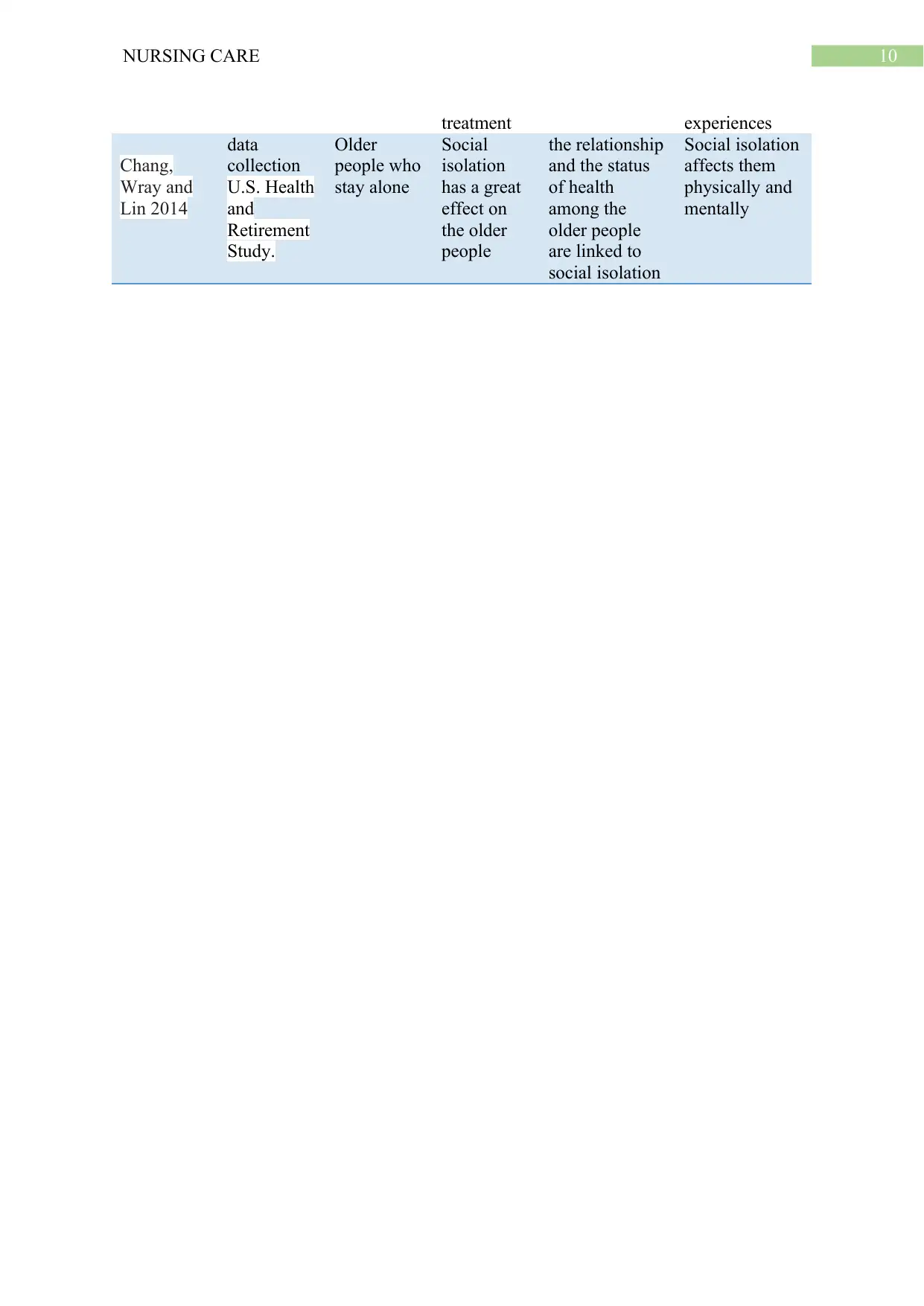
10NURSING CARE
treatment experiences
Chang,
Wray and
Lin 2014
data
collection
U.S. Health
and
Retirement
Study.
Older
people who
stay alone
Social
isolation
has a great
effect on
the older
people
the relationship
and the status
of health
among the
older people
are linked to
social isolation
Social isolation
affects them
physically and
mentally
treatment experiences
Chang,
Wray and
Lin 2014
data
collection
U.S. Health
and
Retirement
Study.
Older
people who
stay alone
Social
isolation
has a great
effect on
the older
people
the relationship
and the status
of health
among the
older people
are linked to
social isolation
Social isolation
affects them
physically and
mentally

11NURSING CARE
⊘ This is a preview!⊘
Do you want full access?
Subscribe today to unlock all pages.

Trusted by 1+ million students worldwide
1 out of 12
Related Documents
Your All-in-One AI-Powered Toolkit for Academic Success.
+13062052269
info@desklib.com
Available 24*7 on WhatsApp / Email
![[object Object]](/_next/static/media/star-bottom.7253800d.svg)
Unlock your academic potential
Copyright © 2020–2026 A2Z Services. All Rights Reserved. Developed and managed by ZUCOL.





